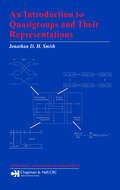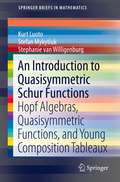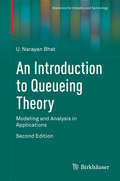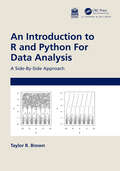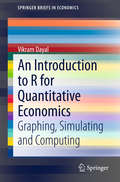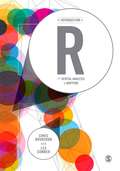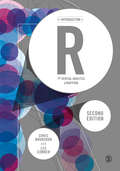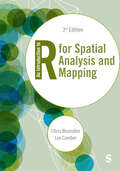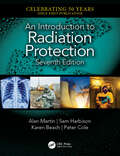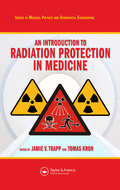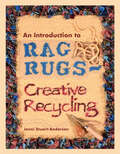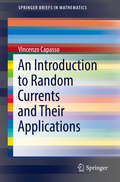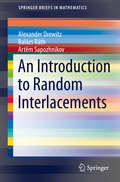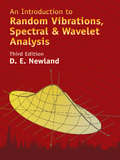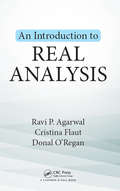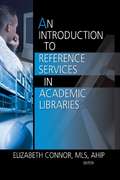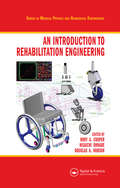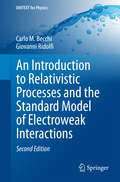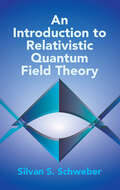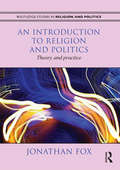- Table View
- List View
An Introduction to Quasigroups and Their Representations (Studies in Advanced Mathematics)
by Jonathan D. SmithCollecting results scattered throughout the literature into one source, An Introduction to Quasigroups and Their Representations shows how representation theories for groups are capable of extending to general quasigroups and illustrates the added depth and richness that result from this extension.To fully understand representation theory,
An Introduction to Quasisymmetric Schur Functions: Hopf Algebras, Quasisymmetric Functions, and Young Composition Tableaux (SpringerBriefs in Mathematics)
by Kurt Luoto Stephanie Van Willigenburg Stefan MykytiukAn Introduction to Quasisymmetric Schur Functions is aimed at researchers and graduate students in algebraic combinatorics. This book introduces readers to the algebra of quasisymmetric functions and its fundamental theory. Results and relevant new contributions are included which pertains to the dynamic new basis of quasisymmetric Schur functions. A state-of-the-art summary is included with respect to an exciting new basis of algebra, which is the basis of quasisymmetric Schur functions, whose combinatorics is analogous to that of the renowned Schur functions.
An Introduction to Queueing Theory: Modeling and Analysis in Applications (Statistics for Industry and Technology)
by U. Narayan BhatThis introductory textbook is designed for a one-semester course on queueing theory that does not require a course on stochastic processes as a prerequisite. By integrating the necessary background on stochastic processes with the analysis of models, the work provides a sound foundational introduction to the modeling and analysis of queueing systems for a broad interdisciplinary audience of students in mathematics, statistics, and applied disciplines such as computer science, operations research, and engineering. This edition includes additional topics in methodology and applications. Key features: * An introductory chapter including a historical account of the growth of queueing theory in more than 100 years. * A modeling-based approach with emphasis on identification of models * Rigorous treatment of the foundations of basic models commonly used in applications with appropriate references for advanced topics. * A chapter on matrix-analytic method as an alternative to the traditional methods of analysis of queueing systems. * A comprehensive treatment of statistical inference for queueing systems. * Modeling exercises and review exercises when appropriate. The second edition of An Introduction of Queueing Theory may be used as a textbook by first-year graduate students in fields such as computer science, operations research, industrial and systems engineering, as well as related fields such as manufacturing and communications engineering. Upper-level undergraduate students in mathematics, statistics, and engineering may also use the book in an introductory course on queueing theory. With its rigorous coverage of basic material and extensive bibliography of the queueing literature, the work may also be useful to applied scientists and practitioners as a self-study reference for applications and further research. ". . . This book has brought a freshness and novelty as it deals mainly with modeling and analysis in applications as well as with statistical inference for queueing problems. With his 40 years of valuable experience in teaching and high level research in this subject area, Professor Bhat has been able to achieve what he aimed: to make [the work] somewhat different in content and approach from other books. " - Assam Statistical Review of the first edition
An Introduction to R and Python for Data Analysis: A Side-By-Side Approach
by Taylor R. BrownAn Introduction to R and Python for Data Analysis helps teach students to code in both R and Python simultaneously. As both R and Python can be used in similar manners, it is useful and efficient to learn both at the same time, helping lecturers and students to teach and learn more, save time, whilst reinforcing the shared concepts and differences of the systems. This tandem learning is highly useful for students, helping them to become literate in both languages, and develop skills which will be handy after their studies. This book presumes no prior experience with computing, and is intended to be used by students from a variety of backgrounds. The side-by-side formatting of this book helps introductory graduate students quickly grasp the basics of R and Python, with the exercises providing helping them to teach themselves the skills they will need upon the completion of their course, as employers now ask for competency in both R and Python. Teachers and lecturers will also find this book useful in their teaching, providing a singular work to help ensure their students are well trained in both computer languages. All data for exercises can be found here: https://github.com/tbrown122387/r_and_python_book/tree/master/data. Instructors can access the solutions manual via the book's website. Key features: - Teaches R and Python in a "side-by-side" way. - Examples are tailored to aspiring data scientists and statisticians, not software engineers. - Designed for introductory graduate students. - Does not assume any mathematical background.
An Introduction to R for Quantitative Economics: Graphing, Simulating and Computing (SpringerBriefs in Economics)
by Vikram DayalThis book gives an introduction to R to build up graphing, simulating and computing skills to enable one to see theoretical and statistical models in economics in a unified way. The great advantage of R is that it is free, extremely flexible and extensible. The book addresses the specific needs of economists, and helps them move up the R learning curve. It covers some mathematical topics such as, graphing the Cobb-Douglas function, using R to study the Solow growth model, in addition to statistical topics, from drawing statistical graphs to doing linear and logistic regression. It uses data that can be downloaded from the internet, and which is also available in different R packages. With some treatment of basic econometrics, the book discusses quantitative economics broadly and simply, looking at models in the light of data. Students of economics or economists keen to learn how to use R would find this book very useful.
An Introduction to R for Spatial Analysis and Mapping
by Chris Brunsdon Lex Comber"In an age of big data, data journalism and with a wealth of quantitative information around us, it is not enough for students to be taught only 100 year old statistical methods using 'out of the box' software. They need to have 21st-century analytical skills too. This is an excellent and student-friendly text from two of the world leaders in the teaching and development of spatial analysis. It shows clearly why the open source software R is not just an alternative to commercial GIS, it may actually be the better choice for mapping, analysis and for replicable research. Providing practical tips as well as fully working code, this is a practical 'how to' guide ideal for undergraduates as well as those using R for the first time. It will be required reading on my own courses." - Richard Harris, Professor of Quantitative Social Science, University of Bristol R is a powerful open source computing tool that supports geographical analysis and mapping for the many geography and 'non-geography' students and researchers interested in spatial analysis and mapping. This book provides an introduction to the use of R for spatial statistical analysis, geocomputation and the analysis of geographical information for researchers collecting and using data with location attached, largely through increased GPS functionality. Brunsdon and Comber take readers from 'zero to hero' in spatial analysis and mapping through functions they have developed and compiled into R packages. This enables practical R applications in GIS, spatial analyses, spatial statistics, mapping, and web-scraping. Each chapter includes: Example data and commands for exploring it Scripts and coding to exemplify specific functionality Advice for developing greater understanding - through functions such as locator(), View(), and alternative coding to achieve the same ends Self-contained exercises for students to work through Embedded code within the descriptive text. This is a definitive 'how to' that takes students - of any discipline - from coding to actual applications and uses of R.
An Introduction to R for Spatial Analysis and Mapping (Spatial Analytics and GIS)
by Chris Brunsdon Lex ComberThis is a new edition of the accessible and student-friendly 'how to' for anyone using R for the first time, for use in spatial statistical analysis, geocomputation and digital mapping. The authors, once again, take readers from ‘zero to hero’, updating the now standard text to further enable practical R applications in GIS, spatial analyses, spatial statistics, web-scraping and more. Revised and updated, each chapter includes: example data and commands to explore hands-on; scripts and coding to exemplify specific functionality; self-contained exercises for students to work through; embedded code within the descriptive text. The new edition includes detailed discussion of new and emerging packages within R like sf, ggplot, tmap, making it the go to introduction for all researchers collecting and using data with location attached. This is the introduction to the use of R for spatial statistical analysis, geocomputation, and GIS for all researchers - regardless of discipline - collecting and using data with location attached.
An Introduction to R for Spatial Analysis and Mapping (Spatial Analytics and GIS)
by Chris Brunsdon Lex ComberThis is a new edition of the accessible and student-friendly 'how to' for anyone using R for the first time, for use in spatial statistical analysis, geocomputation and digital mapping. The authors, once again, take readers from ‘zero to hero’, updating the now standard text to further enable practical R applications in GIS, spatial analyses, spatial statistics, web-scraping and more. Revised and updated, each chapter includes: example data and commands to explore hands-on; scripts and coding to exemplify specific functionality; self-contained exercises for students to work through; embedded code within the descriptive text. The new edition includes detailed discussion of new and emerging packages within R like sf, ggplot, tmap, making it the go to introduction for all researchers collecting and using data with location attached. This is the introduction to the use of R for spatial statistical analysis, geocomputation, and GIS for all researchers - regardless of discipline - collecting and using data with location attached.
An Introduction to R for Spatial Analysis and Mapping (Spatial Analytics and GIS)
by Chris Brunsdon Lex ComberThe ever-expanding availability of spatial data continues to revolutionise research. This book is your go-to guide to getting the most out of handling, mapping and analysing location-based data. Without assuming prior knowledge of GIS, geocomputation or R, this book helps you understand spatial analysis and mapping and develop your programming skills, from learning about scripting and writing functions to point pattern analysis and spatial attribute analysis. The book: Illustrates approaches to analysis on a range of datasets that are new to this edition. Enables you to put your skills into practice with embedded exercises and over 30 self-test questions. Showcases the possibilities of using spatial analysis to explore spatial inequalities. Whether you’re an R novice or experienced user, this book equips upper undergraduates, postgraduates and researchers with the tools needed for spatial data handling and rich analysis.
An Introduction to R for Spatial Analysis and Mapping (Spatial Analytics and GIS)
by Chris Brunsdon Lex ComberThe ever-expanding availability of spatial data continues to revolutionise research. This book is your go-to guide to getting the most out of handling, mapping and analysing location-based data. Without assuming prior knowledge of GIS, geocomputation or R, this book helps you understand spatial analysis and mapping and develop your programming skills, from learning about scripting and writing functions to point pattern analysis and spatial attribute analysis. The book: Illustrates approaches to analysis on a range of datasets that are new to this edition. Enables you to put your skills into practice with embedded exercises and over 30 self-test questions. Showcases the possibilities of using spatial analysis to explore spatial inequalities. Whether you’re an R novice or experienced user, this book equips upper undergraduates, postgraduates and researchers with the tools needed for spatial data handling and rich analysis.
An Introduction to Radiation Protection
by Peter Cole Alan Martin Sam Harbison Karen BeachThis highly-readable account of the nature of the hazards presented by ionizing radiation and the methods of protection is an ideal introductory text for those new to the field, and for the non-specialist. The seventh edition continues to cover the technical principles underlying the control of radiation hazards, radiation detection and measurement and the biological effects of radiation, followed by a consideration of industry-specific radiation protection issues. Further specialised topics include risk assessment, waste management and decommissioning, radiological emergencies, relevant legislation and organizational issues and, new to this edition, environmental radiation protection.
An Introduction to Radiation Protection in Medicine (Series in Medical Physics and Biomedical Engineering)
by Jamie V. Trapp Tomas KronCombining facets of health physics with medicine, An Introduction to Radiation Protection in Medicine covers the background of the subject and the medical situations where radiation is the tool to diagnose or treat human disease. Encouraging newcomers to the field to properly and efficiently function in a versatile and evolving work setting,
An Introduction to Radio Astronomy
by Bernard F. Burke Francis Graham-Smith Peter N. WilkinsonRadio astronomy is an active and rapidly expanding field due to advances in computing techniques, with several important new instruments on the horizon. This text provides a thorough introduction to radio astronomy and its contribution to our understanding of the universe, bridging the gap between basic introductions and research-level treatments. It begins by covering the fundamentals physics of radio techniques, before moving on to single-dish telescopes and aperture synthesis arrays. Fully updated and extensively rewritten, the fourth edition places greater emphasis on techniques, with detailed discussion of interferometry in particular, and comprehensive coverage of digital techniques in the appendices. The science sections are fully revised, with new author Peter N. Wilkinson bringing added expertise to the sections on pulsars, quasars and active galaxies. Spanning the entirety of radio astronomy, this is an engaging introduction for students and researchers approaching radio astronomy for the first time.
An Introduction to Rag Rugs - Creative Recycling: Creative Recycling (Crafts Ser.)
by Jenni Stuart-AndersonMaking is good for you. Exploring crafts can be relaxing and therapeutic : the projects in this book are accessible to anyone who is inspired to recycle old clothes and textiles into unique, decorative, useful projects. Our forbears improvised tools to recycle their worn clothes - mostly dark suiting or mill waste if they lived near a mill. Usually they made mats for their cold floors or as draft excluders across doors. Nowadays you can choose from so many more colors and textures - painting with rags! Try one project or more. You will be able to use the techniques to design and make your own one-off items for your home or as hand-made gifts. The techniques here are traditional and simple - you will be surprised at how drab fabrics become transformed. Simple designs work best and you can even improvise as you work. If a fabric runs out, then use another - I call that organic design! Hooking is the best technique for pictorial detail and different techniques could be combined for original wall art. Historically, rugs were made by several people sitting round a horizontal frame with the children cutting the pieces of rag which were prodded into the hessian (burlap) backing to make a shaggy mat. There is a prodded project (for purists) but you can also achieve the same effect without a frame by progging, which can be done on table or thigh (carefully). Warning – this craft can be addictive!
An Introduction to Random Currents and Their Applications (SpringerBriefs in Mathematics)
by Vincenzo CapassoThis book introduces random currents by presenting underlying mathematical methods necessary for applications. The theory of currents is an advanced topic in geometric measure theory that extends distribution to linear functionals within the space of differential forms of any order. Methods to extend random distributions to random currents are introduced and analyzed in this book. Beginning with an overview of mathematical aspects of the theory of currents, this book moves on to examine applications in medicine, material science, and image analysis. Applied researchers will find the practical modern mathematical methods along with the detailed appendix useful to stimulate new applications and research.
An Introduction to Random Interlacements (SpringerBriefs in Mathematics)
by Alexander Drewitz Balázs Ráth Artëm SapozhnikovThis book gives a self-contained introduction to the theory of random interlacements. The intended reader of the book is a graduate student with a background in probability theory who wants to learn about the fundamental results and methods of this rapidly emerging field of research. The model was introduced by Sznitman in 2007 in order to describe the local picture left by the trace of a random walk on a large discrete torus when it runs up to times proportional to the volume of the torus. Random interlacements is a new percolation model on the d-dimensional lattice. The main results covered by the book include the full proof of the local convergence of random walk trace on the torus to random interlacements and the full proof of the percolation phase transition of the vacant set of random interlacements in all dimensions. The reader will become familiar with the techniques relevant to working with the underlying Poisson Process and the method of multi-scale renormalization, which helps in overcoming the challenges posed by the long-range correlations present in the model. The aim is to engage the reader in the world of random interlacements by means of detailed explanations, exercises and heuristics. Each chapter ends with short survey of related results with up-to date pointers to the literature.
An Introduction to Random Vibrations, Spectral & Wavelet Analysis: Third Edition (Dover Civil and Mechanical Engineering)
by D. E. NewlandOne of the first engineering books to cover wavelet analysis, this classic text describes and illustrates basic theory, with a detailed explanation of the workings of discrete wavelet transforms. Computer algorithms are explained and supported by examples and a set of problems, and an appendix lists ten computer programs for calculating and displaying wavelet transforms.Starting with an introduction to probability distributions and averages, the text examines joint probability distributions, ensemble averages, and correlation; Fourier analysis; spectral density and excitation response relations for linear systems; transmission of random vibration; statistics of narrow band processes; and accuracy of measurements. Discussions of digital spectral analysis cover discrete Fourier transforms as well as windows and smoothing. Additional topics include the fast Fourier transform; pseudo-random processes; multidimensional spectral analysis; response of continuous linear systems to stationary random excitation; and discrete wavelet analysis.Numerous diagrams and graphs clarify the text, and complicated mathematics are simplified whenever possible. This volume is suitable for upper-level undergraduates and graduate students in engineering and the applied sciences; it is also an important resource for professionals.
An Introduction to Real Analysis
by Ravi P. Agarwal Donal O'Regan Cristina FlautThis book provides a compact, but thorough, introduction to the subject of Real Analysis. It is intended for a senior undergraduate and for a beginning graduate one-semester course.
An Introduction to Redox Polymers for Energy-Storage Applications
by Andreas Winter Ulrich S. Schubert George R. NewkomeAn Introduction to Redox Polymers for Energy-Storage Applications Presents a well-founded introduction to the field or Redox Polymers, with didactical features like summary boxes and a Q&A sections An Introduction to Redox Polymers for Energy-Storage Applications discusses fundamental aspects related to polymer-based batteries, such as types of batteries, their historic development, design and synthesis criteria of the active material, and summarizes the various types of redox polymers and their applications. Each chapter contains learning objectives, summary boxes, and questions to allow for efficient exam preparation. In An Introduction to Redox Polymers for Energy-Storage Applications, readers will find detailed information on: Fundamental aspects of redox-active polymers, along with their historical classification, taking the key applications of the materials into account Energy-storage devices, containing polymers as the electrode active materials, and specific material requirements for the desired applications Classification of redox-active polymers, e.g., according to the nature of the actual redox-active moieties, their backbone structure, or topology Electrical conductivity of conjugated polymers, covering their most prominent representatives (polyaniline, polypyrrole, polythiophene, and polyacetylene) An Introduction to Redox Polymers for Energy-Storage Applications also covers the synthesis and applications of these materials, making it an excellent book for graduates, PhD students, and professionals who are starting in this field.
An Introduction to Reference Services in Academic Libraries
by Elizabeth ConnorAn introductory text on various aspects of reference services that requires your students to think!An Introduction to Reference Services in Academic Libraries is a comprehensive textbook that presents compelling case studies and thought-provoking essays that teach the principles of reference services. Eighteen authorities from private and public ac
An Introduction to Rehabilitation Engineering (ISSN)
by Hisaichi Ohnabe Douglas A. Hobson Rory A. CooperThis resource focuses on the principles, modeling, standards, devices, and technologies of rehabilitation engineering and assistive technology. It describes numerous design models and processes, including participatory action design and service delivery models. The book also discusses the components of devices such as cushions, wheelchairs, prostheses, orthoses, hearing aids, and TTYs. The contributors assess industry standards and explore innovative technology aids, such as sensors, robot-assisted therapy, and speech recognition software. The text contains a set of learning objectives and study questions in each chapter as well as a list of definitions at the end of the book.
An Introduction to Relativistic Processes and the Standard Model of Electroweak Interactions (UNITEXT for Physics)
by Carlo M. Becchi Giovanni RidolfiThis book offers a self-contained introduction to the theory of electroweak interactions based on the semi-classical approach to relativistic quantum field theory, with thorough discussion of key aspects of the field. The basic tools for the calculation of cross sections and decay rates in the context of relativistic quantum field theory are reviewed in a short, but complete and rigorous, presentation. Special attention is focused on relativistic scattering theory and on calculation of amplitude in the semi-classical approximation. The central part of the book is devoted to an illustration of the unified field theory of electromagnetic and weak interactions as a quantum field theory with spontaneously broken gauge invariance; particular emphasis is placed on experimental confirmations of the theory. The closing chapters address the most recent developments in electroweak phenomenology and provide an introduction to the theory and phenomenology of neutrino oscillations In this 2nd edition the discussion of relativistic scattering processes in the semi-classical approximation has been revised and as a result intermediate results are now explicitly proven. Furthermore, the recent discovery of the Higgs boson is now taken into account throughout the book. In particular, the Higgs decay channel into a pair of photons, which has played a crucial role in the discovery, is discussed. As in the first edition, the accent is still on the semi-classical approximation. However, in view of the necessity of a discussion of H !, the authors give several indications about corrections to the semiclassical approximation. Violation of unitarity is discussed in more detail, including the dispersion relations as a tool for computing loop corrections; the above-mentioned Higgs decay channel is illustrated by means of a full one-loop calculation; and finally, loop effects on the production of unstable particles (such as the Z0 boson) are now discussed. Finally, the neutrino mass and oscillation analysis is updated taking into account the major achievements of the last years.
An Introduction to Relativistic Quantum Field Theory
by Silvan S. Schweber"Complete, systematic, self-contained...the usefulness and scope of application of such a work is enormous...combines thorough knowledge with a high degree of didactic ability and a delightful style."--Mathematical ReviewsIn a relatively simple presentation that remains close to familiar concepts, this text for upper-level undergraduates and graduate students introduces the modern developments of quantum field theory. Starting with a review of the one-particle relativistic wave equations, it proceeds to a second-quantized description of a system of n particles, demonstrating the connection of this approach with the quantization of classical field theories. An examination of the restriction that symmetries impose on Lagrangians follows, along with a survey of their conservation laws. An analysis of simple models of field theories establishes the models’ content, and the problematic aspects of quantized field theories are explored.Succeeding chapters present the Feynman-Dyson perturbation treatment of relativistic field theories, including an account of renormalization theory, and the formulation of field theory in the Heisenberg picture is discussed at length. The book concludes with an account of the axiomatic formulation of field theory and an introduction to dispersion theoretic methods, in addition to a set of problems designed to acquaint readers with aspects of field theory not covered in the text.
An Introduction to Relativity
by Jayant V. NarlikarGeneral relativity is now an essential part of undergraduate and graduate courses in physics, astrophysics and applied mathematics. This simple, user-friendly introduction to relativity is ideal for a first course in the subject. Beginning with a comprehensive but simple review of special relativity, the book creates a framework from which to launch the ideas of general relativity. After describing the basic theory, it moves on to describe important applications to astrophysics, black hole physics, and cosmology. Several worked examples, and numerous figures and images, help students appreciate the underlying concepts. There are also 180 exercises which test and develop students' understanding of the subject. The textbook presents all the necessary information and discussion for an elementary approach to relativity. Password-protected solutions to the exercises are available to instructors at www. cambridge. org/9780521735612.
An Introduction to Religion and Politics: Theory and Practice
by Jonathan FoxAn Introduction to Religion and Politics offers a comprehensive overview of the many theories of religion and politics, and provides students with an accessible but in-depth account of the most significant debates, issues and methodologies. Fox examines the ways in which religion influences politics, analyses the current key issues and provides a state of the art account of religion and politics, highlighting the diversity in state religion policies around the world. Topics covered include: Secularism and secularization Religious identity Religious worldviews, beliefs, doctrines and theologies Religious legitimacy Religious institutions and mobilization Rational and functional religion Religious fundamentalism Conflict, violence and terror This work combines theoretical analysis with data on the religion policies of 177 governments, showing that while most of the world's government support religion and many restrict it; true neutrality on the issue of religion is extremely rare. Religion is becoming an inescapable issue in politics. This work will be essential reading for all students of religion and politics, and will also be of great interest to those studying related subjects such as comparative politics, international relations and war and conflict studies.
